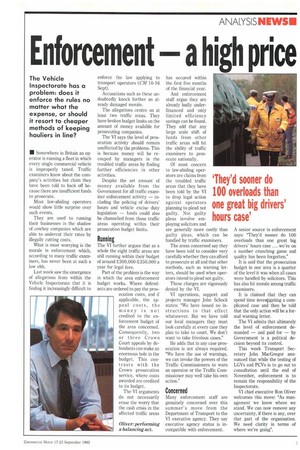Enforcement a high price
Page 23

If you've noticed an error in this article please click here to report it so we can fix it.
The Vehicle Inspectorate has a problem: does it enforce the rules no matter what the expense, or should it resort to cheaper methods of keeping hauliers in line?
• Somewhere in Britain an operator is running a fleet in which every single commercial vehicle is improperly taxed. Traffic examiners know about the company's activities but claim they have been told to back off because there are insufficient funds to prosecute.
Most law-abiding operators would show little surprise over such events.
They are used to running their businesses in the shadow of cowboy companies which are able to undercut their rates by illegally cutting costs.
What is most worrying is the morale in enforcement which, according to many traffic examiners, has never been at such a low ebb.
Last week saw the emergence of allegations from within the Vehicle Inspectorate that it is finding it increasingly difficult to enforce the law applying to transport operators (CM 10-16 Sept).
Accusations such as these undoubtedly knock further an already damaged morale.
The allegations centre on at least two traffic areas. They have broken budget limits on the amount of money available for prosecuting companies.
The VI says the level of prosecution activity should remain unaffected by the problems. This is because money will be recouped by managers in the troubled traffic areas by finding further efficiencies in other activities.
Despite the set amount of money available from the Government for all traffic examiner enforcement activity — including the policing of drivers' hours and vehicle excise duty legislation — funds could also be channelled from those traffic areas operating within their prosecution budget limits.
Running
The VI further argues that as a whole the eight traffic areas are still running within their budget of around £300,000-£350,000 a year for legal fees.
Part of the problem is the way in which the area enforcement budget works. Where defendants are ordered to pay the prosecution costs, and if applicable, the appeal costs, the money is not credited to the enforcement budget of the area concerned. Consequently, two or three Crown Court appeals by defendants can make an enormous hole in the budget. This contrasts with the Crown prosecution service, where costs awarded are credited to its budget.
The VI arguments do not necessarily erase the worry that the cash crisis in the affected traffic areas has occured within the first five months of the financial year.
And enforcement staff argue they are already badly underfinanced and only limited efficiency savings can be found. They add that any large scale shift of funds from other traffic areas will hit the ability of traffic examiners to prosecute nationally.
Of most concern to law-abiding operators are claims from the troubled traffic areas that they have been told by the VI to drop legal action against operators planning to plead not guilty. Not guilty pleas involve employing solicitors and are generally more costly than guilty pleas, which can be handled by traffic examiners.
The areas concerned say they have been told to consider very carefully whether they can afford to prosecute at all and that other methods, such as warning letters, should be used when operators intend to plead not guilty.
These charges are vigorously denied by the VI.
VI operations, support and projects manager John Schock states: "We have issued no instructions to that effect whatsoever. But we have told our local managers they must look carefully at every case they plan to take to court. We don't want to take frivolous cases: He adds that in any case prosecution is not always required. "We have the use of warnings, we can invoke the powers of the Traffic Commissioners to warn an operator or the Traffic Commissioner may well take his own action:
Concerned
Many enforcement staff are genuinely concerned over this summer's move from the Department of Transport to the VI executive agency. They say executive agency status is incompatible with enforcement. A senior source in enforcement says: "They'd sooner do 100 overloads than one great big drivers' hours case ... we're on a number crunching game and quality has been forgotten."
It is said that the prosecution budget in one area is a quarter of the level it was when all cases were handled by solicitors. This has also hit morale among traffic examiners.
It is claimed that they can spend time inve9tigating a complicated case and then be told that the only action will be a formal warning letter.
The VI admits that ultimately the level of enforcement demanded — and paid for — by Government is a political decision beyond its control.
This week Transport Secretary John MacGregor announced that while the testing of LGVs and PCVs is to go out to consultation until the end of November, enforcement is to remain the responsibility of the Inspectorate.
VI chief executive Ron Oliver welcomes this move: "As management we know where we stand. We can now remove any uncertainty, if there is any, over that part of the organisation. We need clarity in terms of where we're going".




























































































